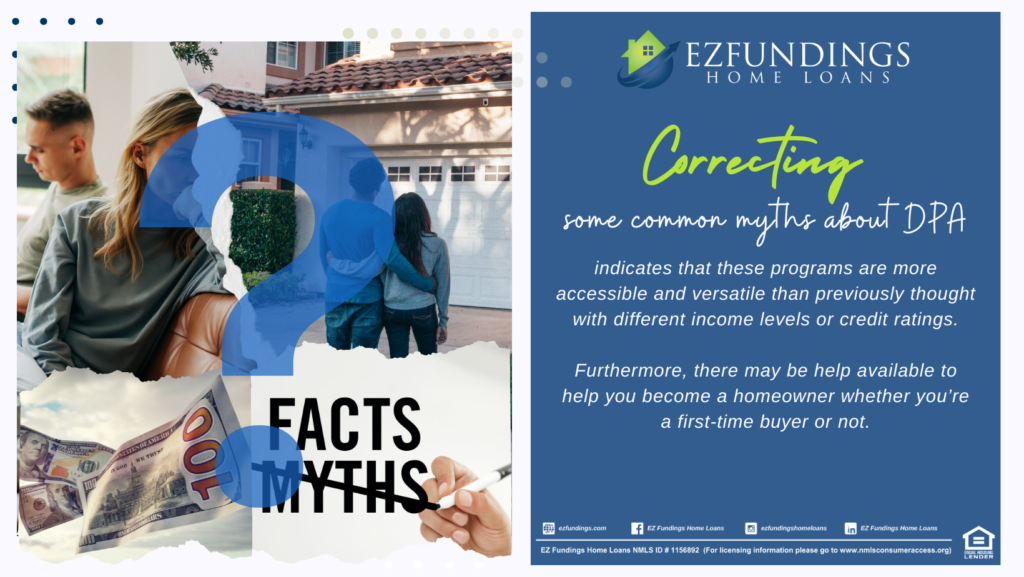Many consumers are scared to buy a home due to misconceptions about Down Payment Assistance (DPA). Let’s debunk some common myths about DPA to help you make more educated judgments.

Only in Certain Areas
These programs are not exclusive to specific areas contrary to popular opinion. They are available throughout the country. Additionally, that is with variations by state and even country. Thus, conduct extensive research to identify programs that are relevant to your area.
Only for First-Time Homebuyers
DPA programs help first-time buyers but they are not limited to them. Hence, repeat buyers may be eligible for help that depends on the program’s conditions. Furthermore, don’t let this notion prevent you from investigating your choices.
Only for Low-Income Borrowers
The programs offered are intended to help people of all economic levels which is not only those in poverty. Eligibility restrictions vary. Also, some programs serve moderate-income households. Definitely, it’s important to confirm your eligibility regardless of income level.
Only for Those with Zero Savings
Having some funds is advantageous. But, it is not necessarily required to qualify for DPA. Some programs allow borrowers to combine their savings with assistance funds. Indeed, this will alleviate the pressure of a substantial down payment. In addition, examine your possibilities based on your financial condition.
Only for Exceptional Credit
They say that having strong credit can increase your chances of approval. But, it is not necessarily required for DPA programs. Conversely, some organizations evaluate alternate credit histories or provide credit counseling to assist applicants improve their ratings. Thus, don’t assume your credit disqualifies you without first researching.
Only Works with FHA
Many DPA programs work with FHA loans. But, they are not the only choice. In addition, some programs accept conventional, VA, and USDA loans, giving borrowers more options. Hence, consider all loan possibilities before assuming constraints.
Harder to Qualify
DPA programs frequently offer liberal qualifying requirements contrary to common myths about DPA. Moreover, income and credit are important considerations. But, employment history, debt-to-income ratio, and homeownership education may all have an impact on eligibility. So, don’t assume it’s out of reach without looking into your possibilities.
Too Much Work/Harder to Close
These DPA applications may necessitate more documentation. But, they are not much more demanding than standard mortgages. Alternatively, the process can be simplified with the correct help from lenders and housing experts. Above all, don’t let the fear of complexity keep you from seeking aid.
Limited Funding
Some myths stated that DPA programs have limited funding but many are continually financed through a variety of means. In addition, new initiatives may emerge that provide various aid alternatives. Thus, keep up with available programs and deadlines to enhance your chances.

Get your copy of the First-time Home Buyer Guide for FREE. Click here.
Conclusion
Correcting some common myths about DPA indicates that these programs are more accessible and versatile than previously thought with different income levels or credit ratings. Furthermore, there may be help available to help you become a homeowner whether you’re a first-time buyer or not. DPA programs come with different income levels or credit ratings. Importantly, conduct extensive research, talk with experts, and examine all of your options to make the best decision for your case. (Read and Learn more about “Alternative Low Down Payment Options for Mortgages” and “Down Payment Assistance Program”.)
